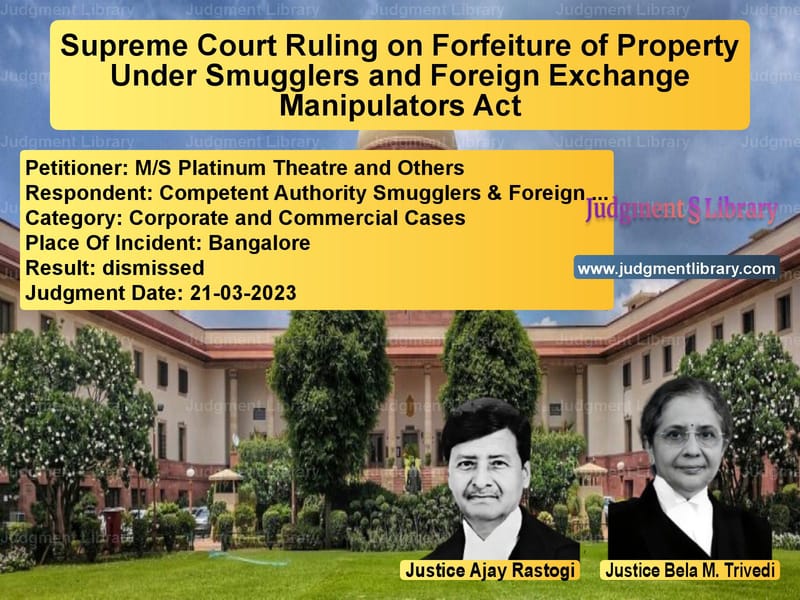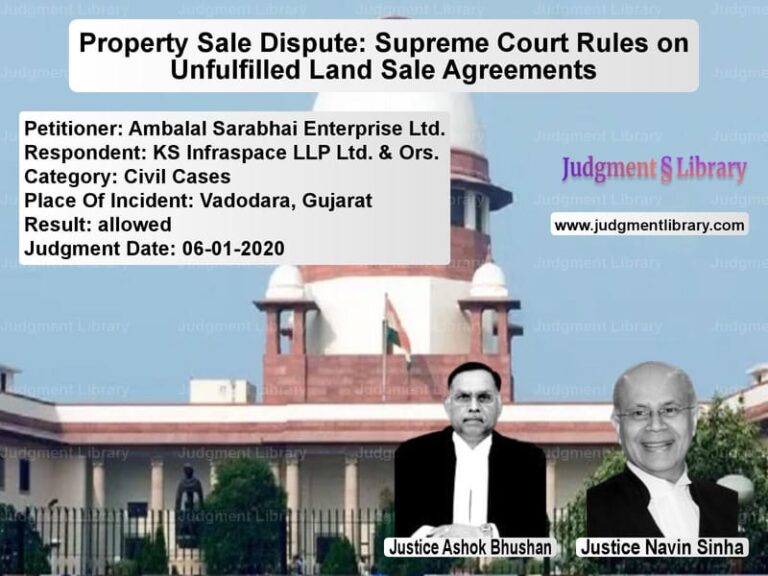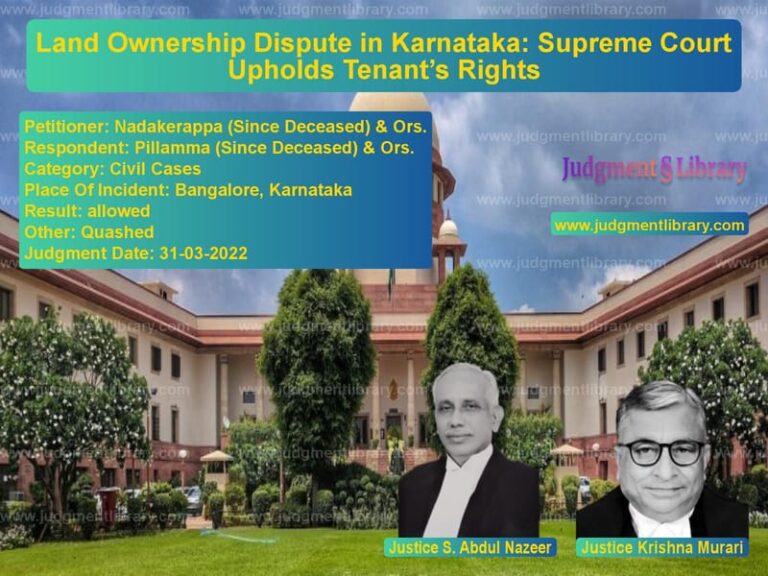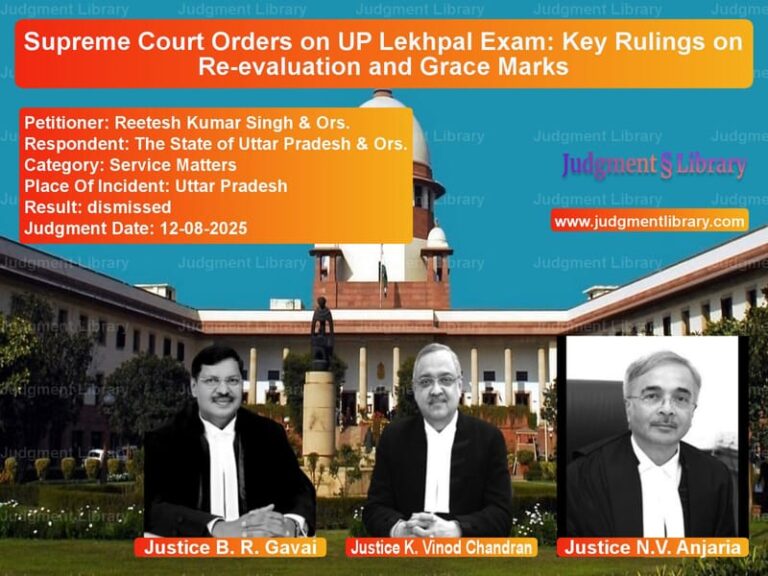Supreme Court Ruling on Forfeiture of Property Under Smugglers and Foreign Exchange Manipulators Act
The Supreme Court of India recently ruled on the legal validity of property forfeiture under the Smugglers and Foreign Exchange Manipulators (Forfeiture of Property) Act, 1976 (SAFEMA), in the case of M/S Platinum Theatre and Others v. Competent Authority Smugglers & Foreign Exchange Manipulators (Forfeiture of Property) Act, 1976 and Another. This ruling has significant implications for property rights, burden of proof in forfeiture cases, and the application of laws to properties allegedly acquired through illicit means.
The case revolved around the forfeiture of M/S Platinum Theatre, which was owned by a partnership firm where one of the partners, N.A. Yusuf, was accused of smuggling activities and had been detained under the Conservation of Foreign Exchange and Prevention of Smuggling Activities Act, 1974 (COFEPOSA). The central issue was whether the property could be forfeited under SAFEMA, given the legal presumption that assets held by persons associated with smugglers are acquired through illicit means.
Background of the Case
The case arose from a forfeiture order issued by the competent authority on December 31, 1997, under Section 7 of SAFEMA. The order was later upheld by the Appellate Tribunal for Forfeited Property, New Delhi, on September 7, 1999, and subsequently by the Karnataka High Court on April 19, 2007.
The appellants, M/S Platinum Theatre and its partners, challenged the forfeiture on several grounds, including the legality of the seizure, delay in proceedings, and the applicability of Section 9 of SAFEMA, which allows a fine in lieu of forfeiture in certain cases.
Arguments of the Parties
Petitioner’s Arguments (M/S Platinum Theatre and Others)
- The land on which the theatre was built was owned by appellant P.M. Saheeda through a registered sale deed dated April 16, 1969, and therefore, its forfeiture was not legally justified.
- Section 9 of SAFEMA should have been applied to offer the appellants an option to pay a fine in lieu of forfeiture, considering that more than 50% of the construction costs were covered by a bank loan.
- The proceedings were excessively delayed, causing prejudice to the appellants, as records from the early 1970s were difficult to trace.
Respondent’s Arguments (Competent Authority)
- Under Section 8 of SAFEMA, the burden of proof lies on the affected person to establish that the property was not acquired from illegal sources, which the appellants failed to do.
- The appellants could not provide any documentary proof for the source of funds used in constructing the theatre, and the investment was attributed to N.A. Yusuf’s smuggling activities.
- There was no significant delay in proceedings, as the forfeiture process began in 1977 and continued through legal channels without unjustified interruptions.
Key Observations of the Supreme Court
The Supreme Court carefully examined the facts of the case, the provisions of SAFEMA, and the previous judicial rulings. The key observations of the Court included:
- Burden of Proof: Under Section 8 of SAFEMA, the affected person is required to prove that the property in question was acquired through legitimate sources. The appellants failed to provide sufficient proof of lawful acquisition.
- Application of Section 9 of SAFEMA: The Court ruled that since more than 50% of the investment in the theatre remained unexplained, the appellants were not entitled to the benefit of Section 9, which allows a fine in lieu of forfeiture.
- Source of Investment: The partnership firm had a total capital of Rs. 10.20 lakhs, of which Rs. 5 lakhs was contributed by N.A. Yusuf. Since the appellants could not justify the source of these funds, the authorities were justified in treating the investment as illegally acquired.
- Delay in Proceedings: The Court dismissed the claim of excessive delay, stating that legal proceedings had been ongoing since 1977 and were not unreasonably prolonged.
- Legitimacy of Forfeiture: Given the failure of the appellants to provide documentary evidence of legitimate acquisition, the forfeiture of M/S Platinum Theatre was deemed lawful under SAFEMA.
Final Ruling
The Supreme Court dismissed the appeal and upheld the forfeiture order. The key conclusions drawn by the Court were:
- The appellants failed to establish that the property was acquired through lawful means.
- There was no violation of procedural fairness, as the appellants were given multiple opportunities to present their case.
- The forfeiture proceedings were legally valid and consistent with the objectives of SAFEMA.
Implications of the Judgment
The ruling has significant implications for cases involving property forfeiture under SAFEMA:
- Strengthening Anti-Smuggling Laws: The judgment reinforces the government’s authority to forfeit properties linked to smuggling and foreign exchange violations.
- Burden of Proof on Affected Parties: Individuals challenging forfeiture orders must provide clear evidence of legitimate acquisition.
- Preventing Misuse of Illicit Wealth: The ruling discourages smugglers and financial offenders from using relatives and associates to conceal illegally acquired assets.
Conclusion
The Supreme Court’s decision in M/S Platinum Theatre and Others v. Competent Authority SAFEMA sets a precedent for future cases involving the forfeiture of properties acquired through illegal means. By reaffirming the principles of SAFEMA, the Court has provided clarity on the scope of the Act, the burden of proof, and the legal consequences of failing to justify the source of assets.
This ruling underscores the judiciary’s commitment to upholding the rule of law while ensuring that individuals accused of financial crimes do not misuse legal loopholes to retain illegally acquired properties.
Petitioner Name: M/S Platinum Theatre and Others.Respondent Name: Competent Authority Smugglers & Foreign Exchange Manipulators (Forfeiture of Property) Act, 1976 and Another.Judgment By: Justice Ajay Rastogi, Justice Bela M. Trivedi.Place Of Incident: Bangalore.Judgment Date: 21-03-2023.
Don’t miss out on the full details! Download the complete judgment in PDF format below and gain valuable insights instantly!
Download Judgment: ms-platinum-theatre-vs-competent-authority-supreme-court-of-india-judgment-dated-21-03-2023.pdf
Directly Download Judgment: Directly download this Judgment
See all petitions in Bankruptcy and Insolvency
See all petitions in Corporate Compliance
See all petitions in unfair trade practices
See all petitions in Company Law
See all petitions in Judgment by Ajay Rastogi
See all petitions in Judgment by Bela M. Trivedi
See all petitions in dismissed
See all petitions in supreme court of India judgments March 2023
See all petitions in 2023 judgments
See all posts in Corporate and Commercial Cases Category
See all allowed petitions in Corporate and Commercial Cases Category
See all Dismissed petitions in Corporate and Commercial Cases Category
See all partially allowed petitions in Corporate and Commercial Cases Category







